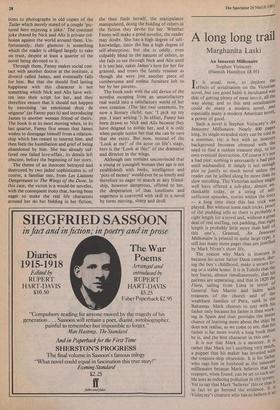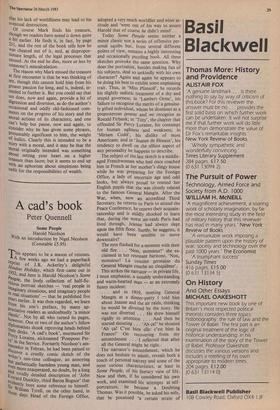A long long trail
Marghanita Laski
An Innocent Millionaire Stephen Vizinczey (Hamish Hamilton £8.95)
Tt is usual, now, to deplore the "effects of serialisation on the Victorian novel, but one good habit it inculcated was that of getting plenty of meat into it, all the way along; and to this end serialisation could do many a modern novel, and especially many a modern American novel, a power of good. Such a novel is Stephen Vizinczey's An Innocent Millionaire. Nearly 400 Pages long, its single-stranded story can be told in a sentence, viz: a boy with an insecure background becomes obsessed with the need to find a sunken treasure ship, to his own eventual destruction. Of course it's ilot a bad plot: nothing is necessarily a bad plot until mishandled. It simply is not enough plot to justify so much novel unless the reader can be jollied along by more than its slow unrolling. The Victorian author might well have offered a sub-plot, almost un- thinkable today, or a string of self- sufficient episodes, stories within the story — a long time since this last trick was, played. But without some such tricks, proot of the pudding tells us there is probablY 3 right length for a novel and, without a great deal of real stuffing, not padding, that right length is probably little more than half of this one's. Granted, An Innocent Millionaire is printed in quite large type; still has many more pages than are justifieu by Mark Niven's short life. The reason why Mark is insecure is because his actor father Dana cannot, dig' ing the boy's childhood, make a secure liv- ing or a stable home. It is in Toledo that the boy learns, almost simultaneously, that his parents are separating, and that in 1820 the Flora, sailing from Lima in terror of General San Martin and laden with treasures of the church and of the wealthiest families of Peru, sank in the Bahamas. Mark chooses to stay with his father only because his father is then work- ing in Spain and thus provides the better chance of learning more about the ship; he does not realise, as we come to see, that his father is far more worth a long book than he is, and the best character in this one. It is not that Mark is a monster. It is rather that Mark isn't anything very mach, a puppet that his maker has invested with the treasure-ship obsession. It is his father who tags him in boyhood as the innocent millionaire because Mark believes that the treasure, when found, can be set to such no- ble uses as reducing pollution in city streets Yet to say that Mark 'believes' this or that is in fact to go beyond the evidence. It is Vizinczey's creature who has to believe it so
that his lack of worldliness may lead to his eventual destruction.
Of course Mark finds his treasure, though we readers have noted it down quite a •bit earlier. He finds it, in fact, by page 211, and the rest of the book tells how he was cheated out of it, and, at dispropor- tionate length, of the legal processes that ensued. At the end he dies, more or less by someone's miscalculation.
The reason why Mark missed the treasure at first encounter is that he was thinking of sex, though this cannot hold him from his greater passion for long, and is, indeed, in- tended to further it. But you could say that sex does, now and again, provide a bit of digression and diversion, as do the author's occasional and oddly old-fashioned com- ments on the progress of his story and the moral actions of its characters; and one can't help but pause, now and again, to consider why he has given some phrases, Presumably significant to him, the weight of italics. Clearly this is intended to be a story with a moral, and it may be that the moral originally intended was something about setting your heart on a higher treasure than lucre; but it seems to end up with an aphorism about simpletons being unfit for the responsibilities of wealth.















































 Previous page
Previous page